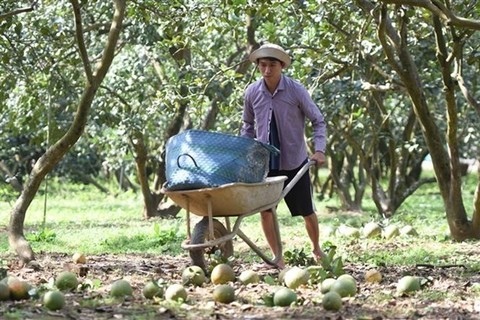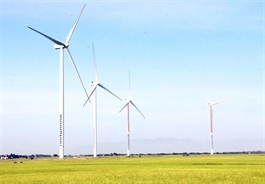Đồng Nai has 13 cooperatives granted planting area codes for fruit exports
Đồng Nai has 13 cooperatives granted planting area codes for fruit exports
Đồng Nai Province has had 13 cooperatives granted planting area codes for fruit crops, enabling exports to international markets including China, the United States, Australia, and New Zealand.

A farmer harvests fruit in Đồng Nai Province. The province has 13 cooperatives granted export fruit growing area codes. — VNA/VNS Photo |
The total planting area is 694 hectares growing fruits including bananas, durians, rambutans and mangoes.
According to the Đồng Nai People’s Committee, establishing planting areas in combination with granting area codes is an essential requirement set by international import markets.
This is not only an important standard for market expansion but also an opportunity to increase export value. As a result, many farming cooperatives in Đồng Nai have actively applied high technology to production and integrated into the value chain.
Currently, the province has over 1,000 cooperative groups, 506 cooperatives, people’s credit funds and one cooperative union, with a total charter capital of over VNĐ1.8 trillion (US$7 million).
Of these, the agricultural sector has 218 cooperatives and one cooperative union, with registered charter capital amounting to VNĐ545 billion, involving 3,442 members and 3,094 regular workers.
The Đồng Nai People’s Committee also noted an increasing number of cooperatives linking with businesses to sell agricultural products. Sixty-four agricultural cooperatives are now participating in product consumption chains, with many products meeting the OCOP (One Commune, One Product) standard. Notably, the province has 22 cooperatives with 39 OCOP products rated three stars or higher, with Trường Phát Agricultural Cooperative and Bình Lợi Agricultural Services Cooperative being standout examples with high-quality products.
Regarding high-tech cooperatives, Đồng Nai has 38 out of 82 crop-growing cooperatives certified under the Good Agricultural Practices (GAP) standard. Additionally, three cooperatives have achieved organic production certification, with an organic farming area of 19.5 hectares.
Looking ahead, Đồng Nai will continue to encourage cooperatives to expand value chains, link with other economic organisations to broaden markets, increase production scale and ensure sustainable development. The province also focuses on building exemplary, modern cooperative models to replicate across the region, ensuring the sustainable development of the collective economy.
The Đồng Nai People’s Committee emphasised that the implementation of Plan No. 227-KH/TU and Resolution No. 20-NQ/TW on enhancing the effectiveness of the collective economy will continue to be carried out effectively, aiming at economic development in the new phase.


























